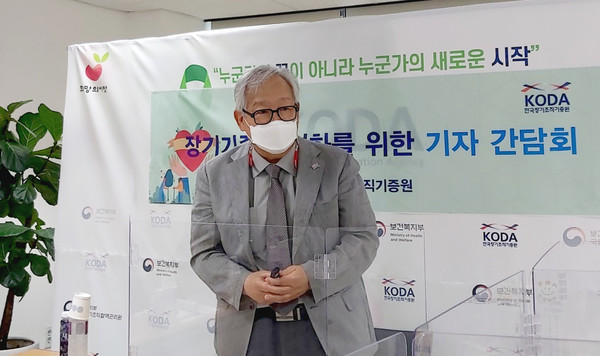Organ donations shrank due to anxiety over Covid-19 transmission in other countries, but they expanded in Korea in 2020, an organ donation agency chief said.
However, over 35,000 people are still waiting for organ transplants, and the public needs to participate in organ donations more actively, he said.
Korea Organ Donation Agency (KODA) President Moon In-sung emphasized the need for a change in social perception of organ donation, saying the local consent rate for brain death organ donation was still too low, at a press conference in Seoul, Thursday.
Last year, the number of organ donations decreased in most countries, including those with high rates of brain death organ donations.
According to the U.S. Gift of Life Donor Program, Spain’s organ donors-per-million-population (pmp) went down from 49.6 in 2019 to 37.4 in 2020. The number in Portugal also declined from 33.7 to 24.6, and that of France, from 33.3 to 22.4, over the same period. These countries used to have high numbers of organ donations.
In contrast, the number of organ donations in Korea went up to 478 in 2020, a 6.2 percent increase from 458 in 2019. As a result, Korea was relatively more active in organ donation in Asia, according to KODA.

However, 35,852 Korean patients were waiting for organ donations in 2020.
“Five or six patients per day die while waiting for transplants,” Moon said. “The consent rate of brain death organ donation, reported at medical institutions, is about 36 percent. But the real number of donations is much lower.”
Moon attributed the low rate of organ donations to poor social perception. However, continuous PR activities and education have helped people turn away from the negative sentiment about organ donation.
“Negative news reports about organ donation kept being reported between 2017 and 2018, but this atmosphere has died down over time,” Moon said. Since 2019, KODA has aggressively promoted organ donation, and media reports about organ donation stories have given the public a positive perception, he added.
He said not only medical schools but middle and high schools should have a curriculum on organ donation. Continuous publicity and education will naturally lead to active organ donations without much problem, he added.
KODA recently established a private-public collaboration body under the government’s plan to promote organ donations and human issues announced in March.
“Only 4 percent of Korean people want to donate their organs. Our goal is to gradually raise the proportion to 40 percent by 2050,” Moon said, hoping that there will be no more patients waiting for organs 30 years later.
KODA held the “2021 KODA Global Online Forum” on Friday to share the changing status of organ donation and transplantation amid the Covid-19 crisis and to discuss policies and pending issues.

